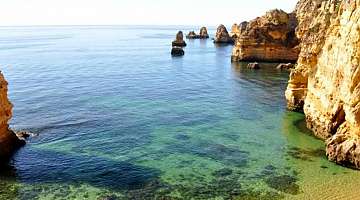Number of Blue Flag Portuguese Beaches Increases in 2013

Algarve Beach
Published on
In 2013, the number of Portuguese beaches to receive a Blue Flag increased to 277, European Blue Flag Association – the organisation handing out the Blue Flags – announced. This means that two more beaches have gotten the distinction of high quality since 2012.
European Blue Flag Association announced during a press conference in Cascais that the central part of the country and the Alentejo region have received more Blue Flags than during 2012. The number of Blue Flags remained unchanged in Tagus and Algarve regions, as well as in the north of the country.
Madeira has also increased the number of Blue Flags from 11 to 13. The Azores on the other hand, lost five Blue Flags since 2012. According to European Blue Flag Association, Praia da Vitória municipality failed meeting the Blue Flag requirements, which led to the loss of the five distinctions on the Azores.
The region of North Portugal has gotten the impressive 67 Blue Flags, which is the same as in 2012. Central Portugal follows with 27 Blue Flags, which is three more than the number of high quality recognitions for 2012.
The municipalities of Góis and Penacova are having Blue Flag beaches for the first time.
Alentejo got 25 Blue Flags, which is one more than the flags received in 2012. Tagus region got 49 Blue Flags. Algarve brags an even more spectacular result than North Portugal. The region received 69 Blue Flags. The number is also unchanged since 2012.
President of the European Blue Flag Association José Archer said that awareness campaigns will be used to educate about nature preservation and keeping beaches clean. A number of hoisting ceremonies will be held throughout Portugal, starting with Lagos on June 1. A ceremony will take place in Coimbra on June 11 and in Quinta do Lorde Marina on June 15.
A beach or a marina has to meet a vast number of requirements, in order to receive a Blue Flag. The most important criteria include the quality of the water, beach safety, service provision, general environmental management and environmental education. The quality of the water is tested both visually and through a microbiological laboratory exam.
The criteria for marinas are a bit more different. To provide a Blue Flag, the European Blue Flag Association examines environmental management, emergency and first-aid equipment availability, water quality and the availability of adequate services like electricity, facilities for the disabled and lifesaving.
The status of each of the beaches is re-examined on an annual basis. It is possible for a beach that performs poorly to lose the Blue Flag that it received the previous year. According to some statistics, the number of Blue Flags awarded internationally each year goes up due to better management and the introduction of the right beach maintenance practices.
Published in: Guide to Portugal / Portuguese Life